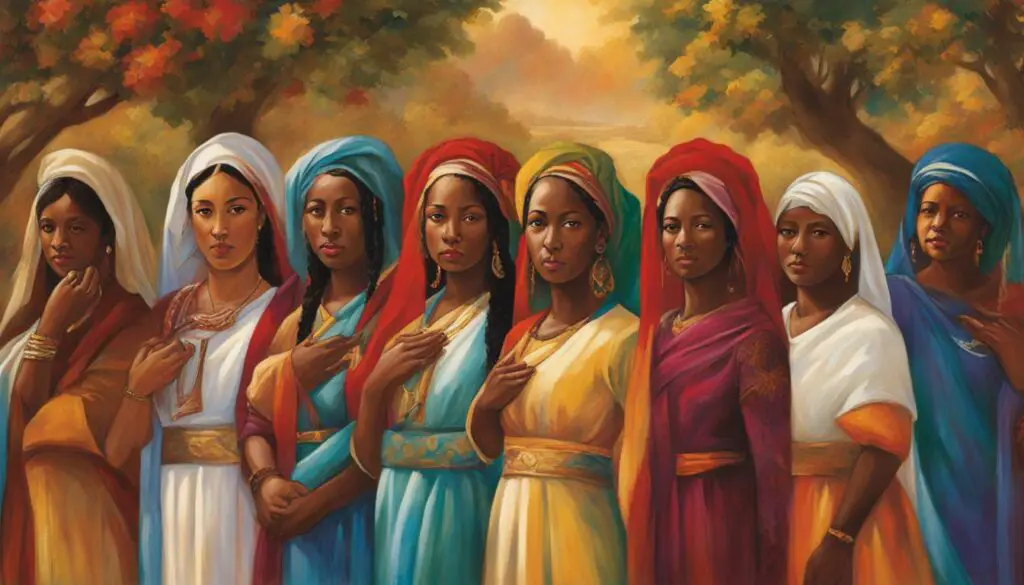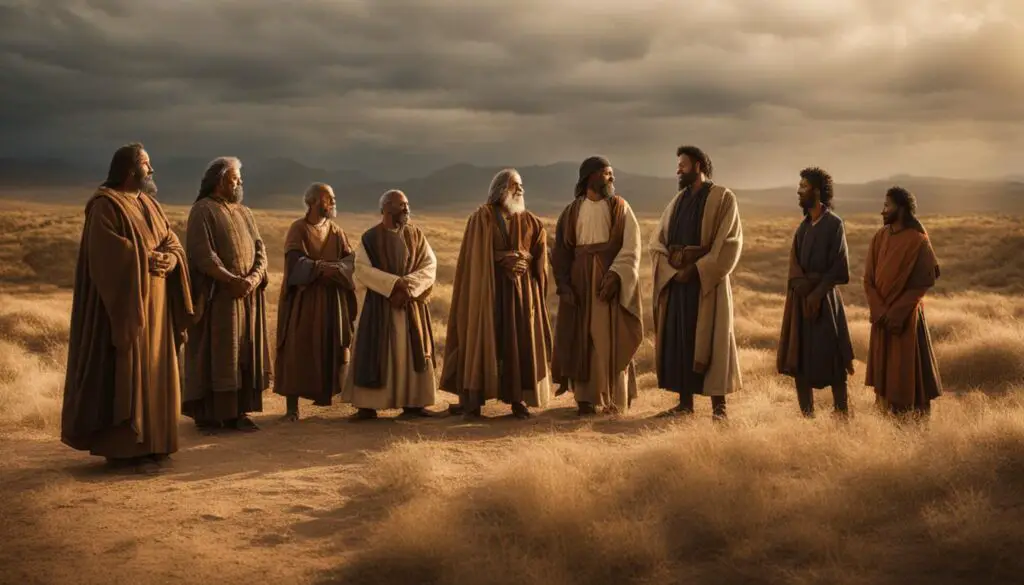The Bible is filled with various individuals who have impacted history and inspired us with their stories. From the Old Testament to the New Testament, these biblical figures provide valuable lessons and insights for our own lives. Let’s dive into the world of biblical characters and explore their significance.
Key Takeaways:
- Learn from the patriarchs and matriarchs who laid the foundation for God’s chosen people.
- Discover the wisdom and courage of prophets and leaders who delivered God’s message.
- Explore the lives of New Testament figures who followed Jesus and spread His teachings.
- Find inspiration from the women of the Bible who demonstrated faith and resilience.
- Reflect on the consequences of the villains and antagonists who opposed God’s plan.
Patriarchs and Matriarchs of the Bible
The Bible is filled with influential figures who shaped the course of history and left a lasting impact on the world. Among these biblical figures are the patriarchs and matriarchs, such as Abraham and Sarah, who played crucial roles in the formation of Israel as God’s chosen people. Their unwavering faith and obedience to God’s promises serve as a timeless example for believers today. prophets and saints
Abraham, known as the father of the Hebrew people, received a divine call from God to leave his homeland and journey to a new land that God would show him. He displayed unwavering faith as he trusted in God’s guidance and promises, even in the face of uncertainty. Sarah, Abraham’s wife, demonstrated remarkable faith as well, particularly in her old age when she gave birth to their long-awaited son, Isaac.
Through the lives of Abraham and Sarah, we see the importance of trust and obedience in our relationship with God. Their story teaches us about the faithfulness of God and His ability to fulfill His promises, even when circumstances seem impossible. As we study the lives of these patriarchs and matriarchs, we gain valuable insights into faith, perseverance, and the enduring love of God. biblical leaders

Table: Key Events in the Lives of Abraham and Sarah
| Event | Description |
|---|---|
| God’s Call to Abraham | Abraham receives a divine call from God to leave his homeland and embark on a journey to a new land. |
| Covenant with God | God promises Abraham descendants as numerous as the stars in the sky and a land for his descendants. |
| The Birth of Isaac | Despite their old age, Sarah miraculously gives birth to Isaac, the long-awaited son and heir of the covenant. |
| Testing of Abraham’s Faith | God commands Abraham to sacrifice his son Isaac as a test of his faith and obedience. |
| The Covenant Sealed | God reaffirms His covenant with Abraham and promises blessings and protection for his descendants. |
Prophets and Leaders in the Bible
The Bible is not only a collection of stories but also a source of wisdom and guidance through the lives of its characters. Prophets and leaders, such as Moses, Elijah, and Isaiah, played significant roles in shaping the history and faith of the people of Israel. Their stories inspire us to embrace courage, obedience, and the pursuit of justice.
Moses, known as the deliverer of the Israelites from slavery in Egypt, demonstrates the power of God’s presence and His faithfulness to His promises. Through Moses’ leadership, the people witnessed miracles, received the Ten Commandments, and journeyed towards the Promised Land. His unwavering commitment to God’s calling teaches us the importance of trusting in divine guidance. biblical leaders
“I will raise up for them a prophet like you from among their fellow Israelites, and I will put my words in his mouth. He will tell them everything I command him.” – Deuteronomy 18:18
Elijah, on the other hand, was a bold prophet who fearlessly confronted injustice and idolatry in Israel. His fiery character and powerful miracles demonstrated the supremacy of God and His desire for His people’s repentance. Elijah’s story challenges us to stand up for truth, even in the face of opposition.
Isaiah, often referred to as the “prince of prophets,” brought messages of hope and correction to the people of Israel. His prophecies not only foreshadowed the coming of the Messiah but also called for justice and righteousness among the people. Isaiah’s words inspire us to speak truth and seek the restoration of God’s kingdom here on earth.
| Prophet | Leadership Qualities |
|---|---|
| Moses | Divine guidance, faithfulness, and courage |
| Elijah | Fearlessness, devotion to God’s truth, and the pursuit of justice |
| Isaiah | Hope, correction, and advocacy for justice and righteousness |
New Testament Figures: Apostles and Disciples
The New Testament introduces us to a new set of biblical figures who followed Jesus and spread His teachings. The apostles, such as Peter, Paul, and John the Baptist, and the disciples were key players in the early church, contributing to the growth and development of Christianity. Their lives were marked by dedication, sacrifice, and a deep love for Christ. notable figures in the bible
One of the most prominent figures among the apostles was Peter. Known for his boldness and impulsive nature, Peter played a pivotal role in the establishment of the early Christian church. Despite his initial denial of Jesus, Peter’s unwavering faith and repentance set an example for believers throughout history. Through his preaching and leadership, Peter played a crucial role in spreading the message of salvation.
Paul, formerly known as Saul, was another influential figure in the New Testament. Initially a persecutor of Christians, Paul’s dramatic conversion on the road to Damascus transformed him into a passionate advocate for Christ. His missionary journeys and epistles, which make up a significant portion of the New Testament, continue to guide believers today. Paul’s emphasis on grace, faith, and the unity of believers remains foundational to Christian theology.
| Apostles | Role |
|---|---|
| Peter | Leader of the apostles, preached on Pentecost |
| Paul | Wrote numerous letters (epistles) to churches |
| John the Baptist | Prepared the way for Jesus, baptized him |
John the Baptist, a key figure in the New Testament, is often referred to as the forerunner of Jesus. His ministry focused on preparing the people for the coming Messiah and baptizing Jesus in the Jordan River. John’s humility and dedication to his mission serve as an inspiration for believers today. bible role models
The lives and teachings of these New Testament figures offer valuable lessons for believers in every generation. Their unwavering commitment to Christ, despite facing various challenges and persecution, inspires us to follow Jesus wholeheartedly and share His message with the world.

Women of the Bible: Role Models and Inspirations
The Bible is rich with stories of remarkable women who have made significant contributions to the biblical narrative. Their lives offer valuable lessons and serve as inspiration for people of all generations. Let’s explore the stories of three influential women in the Bible: Ruth, Esther, and Mary Magdalene.
Ruth: A Testament of Loyalty and Perseverance
Ruth’s story is a beautiful demonstration of loyalty and perseverance. After her husband’s death, she chose to stay with her mother-in-law, Naomi, even when given the opportunity to return to her own homeland. Ruth’s unwavering devotion led her to glean in the fields of Boaz, where she caught the attention of this redeeming kinsman. Through this divine connection, Ruth and Boaz married, creating a lineage that led to the birth of King David and eventually Jesus Christ. judges
“Where you go I will go, and where you stay I will stay. Your people will be my people and your God my God.” – Ruth 1:16
Esther: Courage and Faith in the Face of Adversity
Esther’s story showcases courage and faith in the face of great adversity. As a young Jewish woman, she became queen of Persia during a time when her people were threatened with destruction. Despite the dangers, Esther embraced her role and risked her life by approaching the king uninvited to plead for the lives of her people. Through her bravery and trust in the Lord, Esther saved the Jewish nation from annihilation. new testament characters
Mary Magdalene: A Witness to Redemption and Grace
Mary Magdalene is known as a devoted follower of Jesus Christ and played a significant role in the events surrounding His crucifixion and resurrection. She stood faithfully at the foot of the cross and became the first witness to Jesus’ resurrection. Mary’s unwavering faith and commitment to her Savior exemplify the power of redemption and the transformative grace of God. symbolic figures
| Character | Key Attributes | Notable Quotes |
|---|---|---|
| Ruth | Loyalty, Perseverance | “Where you go I will go, and where you stay I will stay. Your people will be my people and your God my God.” – Ruth 1:16 |
| Esther | Courage, Faith | “And who knows but that you have come to your royal position for such a time as this?” – Esther 4:14 |
| Mary Magdalene | Devotion, Witness to Redemption | “I have seen the Lord!” – John 20:18 |
These women of the Bible serve as role models and inspirations for believers today. Their stories remind us of the importance of loyalty, courage, faith, and the transformative power of God’s grace. Through their lives, we can learn valuable lessons and draw strength for our own journeys of faith.

Villains and Antagonists in the Bible
Villains and antagonists play a significant role in the biblical narrative, showcasing the consequences of their actions and the importance of making wise choices. These characters provide valuable lessons about the human condition and the consequences of greed, pride, and betrayal. Let’s explore some of the notable villains in the Bible and the lessons we can learn from their stories.
Judas Iscariot: The Betrayer
“Then one of the Twelve—the one called Judas Iscariot—went to the chief priests and asked, ‘What are you willing to give me if I deliver him over to you?’ So they counted out for him thirty pieces of silver.”
Judas Iscariot, one of Jesus’ disciples, infamously betrayed Jesus for thirty pieces of silver, leading to his arrest and crucifixion. His story serves as a cautionary tale about the destructive power of greed and the importance of loyalty. Judas’ actions remind us to be vigilant in guarding our hearts against the allure of material gain and to prioritize integrity in our relationships.
Pharaoh: The Oppressor
“Let my people go, so that they may worship me. But I will harden Pharaoh’s heart, and though I multiply my signs and wonders in Egypt, he will not listen to you.”
Pharaoh, the ruler of Egypt during Moses’ time, is depicted as an oppressive force against the people of Israel. Despite witnessing numerous miracles and plagues, Pharaoh refused to let the Israelites leave Egypt, leading to their prolonged suffering. Pharaoh’s stubbornness serves as a reminder of the consequences of pride and the importance of humility. His story teaches us the value of listening to God’s voice and the need to release our grip on power and control.
Pontius Pilate: The Indecisive
“Pilate said to them, ‘What shall I do, then, with Jesus who is called the Messiah?’ They all answered, ‘Crucify him!’
Pontius Pilate, the Roman governor of Judea, faced the decision of whether to release or crucify Jesus. Despite recognizing Jesus’ innocence, Pilate succumbed to the pressure of the crowds and ordered His crucifixion. Pilate’s indecisiveness illustrates the danger of compromising our convictions and the importance of standing up for what is right, even in the face of opposition.
| Villain | Lesson Learned |
|---|---|
| Judas Iscariot | The destructive power of greed and the importance of loyalty. |
| Pharaoh | The consequences of pride and the importance of humility. |
| Pontius Pilate | The danger of compromising convictions and the importance of standing up for what is right. |
By examining the stories of biblical villains like Judas Iscariot, Pharaoh, and Pontius Pilate, we gain a deeper understanding of the consequences of their actions and the lessons they teach us. These characters remind us of the importance of making wise choices, guarding against destructive tendencies, and living with integrity and humility. The Bible presents their stories not only as cautionary tales but also as opportunities for personal growth and reflection.

Angelic Beings and Spiritual Figures in Scripture
The Bible introduces us to a fascinating array of angelic beings and spiritual figures. These celestial entities serve as messengers, protectors, and intermediaries between heaven and earth. Their presence in the biblical narrative highlights the supernatural realm and the intricate relationship between the divine and human.
One of the most well-known angelic beings mentioned in the Bible is Gabriel. Known as the “messenger angel,” Gabriel has a significant role in various biblical accounts. He appears to the prophet Daniel to interpret visions and deliver messages from God. Gabriel is also present in the New Testament, foretelling the birth of Jesus to Mary, and announcing the birth of John the Baptist to Zechariah. Through his interactions with humans, Gabriel exemplifies both obedience to God’s command and compassion towards humankind.
Another prominent spiritual figure in Scripture is Michael, the archangel. Michael appears in the book of Daniel, where he is described as a powerful heavenly prince and defender of God’s people. In the New Testament, Michael is mentioned in the book of Jude, contending with the devil over the body of Moses. His role as a warrior and protector highlights the ongoing battle between good and evil in the spiritual realm.
“Do not be afraid,” the angel said to them, “for behold, I bring you good news of great joy that will be for all the people. Today in the City of David, a Savior has been born to you; he is Christ the Lord.” – Luke 2:10-11
The Role of Angels in the Bible
Throughout the Bible, angels are portrayed as God’s messengers and servants, carrying out His will. They are often seen providing guidance, protection, and comfort to individuals and communities. Angels also play a significant role in the spiritual battles between good and evil, as illustrated by Michael’s confrontation with the devil.
Cherubim and seraphim are distinct celestial beings mentioned in the Bible. Cherubim are often depicted as guarding the entrance to the Garden of Eden, symbolizing the separation between humanity and God’s presence. Seraphim, on the other hand, are described as celestial creatures surrounding the throne of God, praising Him with their voices. These descriptions highlight the awe-inspiring nature of these spiritual figures and their close proximity to the divine presence.
| Angelic Figure | Role |
|---|---|
| Gabriel | Messenger and interpreter of divine visions |
| Michael | Defender and protector of God’s people |
| Cherubim | Guardians of sacred spaces |
| Seraphim | Praisers of God’s glory |
The presence of these angelic beings and spiritual figures in Scripture reminds us of the immense power and love of God. They serve as a reminder of His constant care, guidance, and protection over His creation. Exploring their roles in the biblical narrative can deepen our understanding of the supernatural realm and our relationship with the divine.

Patriarchs and Matriarchs of the Bible
The Bible is filled with numerous figures who played significant roles in shaping the course of history. Among them, the patriarchs and matriarchs hold a special place. These biblical figures, such as Abraham and Sarah, embody faith, perseverance, and the fulfillment of God’s promises. lesser-known biblical figures
Abraham: As the father of many nations, Abraham’s faith and obedience to God’s call set the stage for the establishment of Israel as God’s chosen people. His unwavering trust in God’s promises, even in the face of uncertainty, teaches us the importance of faithfulness and the rewards of trusting in God’s plan. biblical perspectives
Sarah: Sarah, Abraham’s wife, exemplifies resilience and patience. Despite her advanced age, she gave birth to Isaac, the child of promise. Her journey reminds us that God’s timing is perfect, and when we trust in Him, He can bring forth fruitful blessings even in the most unlikely circumstances. genesis figures
| Biblical Figures | Significance |
|---|---|
| Abraham | Founder of Israel as God’s chosen people |
| Sarah | Exemplifies resilience and patience |
Studying the lives of these patriarchs and matriarchs offers us valuable insights into trust, perseverance, and the faithfulness of God. Their stories inspire us to have unwavering faith in God’s promises and to patiently wait for His perfect timing in our own lives. good samaritan
Lesser-Known Characters in Scripture
While the Bible is filled with well-known figures such as Adam and Eve, Moses, and King David, there are many lesser-known characters who played important roles in the biblical narrative. Their stories may not be as widely recognized, but they offer unique perspectives and valuable lessons for us today. Let’s take a closer look at some of these lesser-known biblical characters.
Josiah
Josiah was a young king of Judah who ascended to the throne at the age of eight. Despite his tender age, Josiah was known for his unwavering commitment to God and his efforts to bring about spiritual reform in the nation. He initiated a thorough cleansing of idolatry and implemented religious reforms based on the Law of Moses. Josiah’s story reminds us that age is not a barrier to making a significant impact and standing firm in our faith.
Tabitha
Tabitha, also known as Dorcas, was a disciple of Jesus Christ who lived in the city of Joppa. She was known for her acts of kindness and her skill in making garments for the needy. When Tabitha fell ill and died, the believers sent for the apostle Peter, who prayed over her and raised her from the dead. Tabitha’s story highlights the importance of serving others selflessly and the power of faith in bringing about miraculous interventions.
Barnabas
Barnabas was a companion of the apostle Paul and played a significant role in the early Christian community. His real name was Joseph, but he was given the nickname “Barnabas,” which means “son of encouragement.” Barnabas was known for his generous spirit and his ability to bring people together. He played a key role in accepting and supporting Paul when others were skeptical of his conversion. Barnabas teaches us the importance of encouragement, acceptance, and unity within the body of Christ.
| Character | Significance |
|---|---|
| Josiah | A young king who brought spiritual reforms to Judah. |
| Tabitha | A disciple known for her acts of kindness and being raised from the dead. |
| Barnabas | A companion of Paul, known for his encouragement and support. |
Exploring the lives of these lesser-known biblical characters expands our understanding of God’s work in the world. Each character, no matter how obscure, has a unique story that contributes to the overall narrative of salvation and redemption. As we delve into their experiences, we uncover hidden wisdom, find inspiration, and gain a broader perspective on faith and the human condition.

Comparative Studies and Perspectives on Biblical Figures
Studying biblical figures from different perspectives and exploring their lives through comparative studies provides a deeper understanding of their significance and the timeless wisdom they impart. By examining the similarities and differences between these characters, we gain fresh insights into their experiences, teachings, and the overarching themes of the Bible.
Patriarchs and Matriarchs: Abraham vs. Sarah
In comparing Abraham and Sarah, we see the complementary roles they played in God’s plan. Abraham, known for his unwavering faith, exemplified trust in God’s promises. Sarah, on the other hand, exhibited patience and resilience as she waited for the fulfillment of God’s covenant. Through their lives, we learn about the power of faith and the importance of perseverance in our own journey.
Prophets and Leaders: Moses vs. Elijah
Moses and Elijah were two influential figures in Israel’s history, each carrying a unique mantle of leadership. Moses, chosen by God to lead the Israelites out of Egypt, demonstrated humility and obedience. Elijah, as a prophetic voice during troubled times, showcased courage and a deep devotion to God. By studying their lives, we discover valuable lessons on leadership, courage, and the unwavering faithfulness of God.
New Testament Figures: Peter vs. Paul
Peter and Paul, prominent apostles in the early Christian church, played distinct roles in spreading the gospel. Peter, known for his impulsive nature, experienced profound transformation and became a pillar of faith. Paul, a zealous persecutor turned passionate evangelist, traveled extensively to preach the message of Christ. Comparing their journeys reveals the transformative power of God’s grace and the inclusive nature of the gospel.
| Biblical Figure | Key Lesson |
|---|---|
| Ruth | The power of loyalty and devotion |
| Judas Iscariot | The consequences of betrayal and greed |
| Gabriel | Divine messenger and agent of God’s will |
By delving into comparative studies and examining diverse perspectives on biblical figures, we uncover a wealth of wisdom and profound truths. These studies foster a deeper understanding of God’s character, His plan for humanity, and the timeless relevance of the Bible. To further enhance our exploration of these characters, various biblical studies resources provide valuable insights and scholarly perspectives that enrich our understanding and appreciation of their stories.
Through comparative studies and a multi-faceted approach to understanding biblical figures, we can gain a richer perspective on their lives and teachings. By delving into the lives of the patriarchs and matriarchs, prophets and leaders, New Testament figures, women of the Bible, villains and antagonists, angelic beings and spiritual figures, symbolic and allegorical characters, and lesser-known personalities, we deepen our understanding of the overarching themes and lessons of the Bible.
Genesis Figures: Adam and Eve
The book of Genesis introduces us to Adam and Eve, the first humans created by God. Their story holds great significance in understanding the origins of humanity, the consequences of disobedience, and the need for redemption. Let’s delve into their lives and explore the lessons we can learn from these biblical characters.
The Story of Adam and Eve
Adam and Eve were created by God in His own image and placed in the Garden of Eden. They were given the freedom to enjoy everything in the garden except for the fruit of the tree of the knowledge of good and evil. Tempted by the serpent, they disobeyed God’s command and ate the forbidden fruit, resulting in the fall of humanity and the introduction of sin into the world.
This act of disobedience had severe consequences for Adam and Eve. They were banished from the Garden of Eden, and their relationship with God was strained. Pain, suffering, and mortality became a part of the human experience. However, even in the midst of their disobedience and the subsequent consequences, there is a glimmer of hope. God promised a savior who would come to redeem humanity and restore the broken relationship between God and mankind.
Lessons from Adam and Eve
The story of Adam and Eve teaches us several important lessons. Firstly, it highlights the reality of human temptation and the consequences of yielding to it. It serves as a reminder that we need to be vigilant and resist the temptations that come our way, always relying on God’s guidance and strength.
Secondly, Adam and Eve’s story emphasizes the importance of obedience to God’s commands. Their disobedience led to separation from God and the loss of the perfect state they enjoyed in the Garden of Eden. Their actions teach us the significance of honoring and obeying God in our own lives, recognizing that His commands are meant for our good and protection.
Finally, the story of Adam and Eve points us towards the hope of redemption and restoration through Christ. Despite their disobedience, God’s promise of a savior reveals His love and faithfulness towards humanity. Through Christ’s sacrifice on the cross, our broken relationship with God can be repaired, and we can experience forgiveness and eternal life.
| Lessons from Adam and Eve |
|---|
| The reality of human temptation |
| The importance of obedience to God’s commands |
| The hope of redemption through Christ |
The story of Adam and Eve serves as a foundational narrative in the Bible, providing insights into the nature of sin, God’s mercy, and the importance of obedience. It reminds us of the need for redemption and points us towards the hope found in Christ. By studying the lives of these biblical characters, we can deepen our understanding of God’s plan and His unending love for humanity.
Abraham and Sarah: Models of Faith
Abraham and Sarah are revered as models of faith in the Bible. Their journey of trust in God’s promises, including the birth of their son Isaac in their old age, exemplifies the rewards of unwavering faith and obedience. Their story teaches us about the faithfulness of God and the power of His plans.
Abraham, originally known as Abram, was called by God to leave his homeland and journey to a new land that God would show him. Despite not knowing where he was going, Abraham trusted God and embarked on this extraordinary journey of faith. Throughout his life, Abraham encountered various challenges, but he remained steadfast in his belief that God would fulfill His promises.
Sarah, Abraham’s wife, played an equally significant role in their story. Although initially barren, Sarah received a miraculous promise from God that she would bear a child in her old age. Despite doubting God’s ability to bring about this promise, Sarah eventually recognized the power of God’s faithfulness and became a mother to Isaac.
Abraham and Sarah’s story serves as a powerful reminder of the importance of trusting in God’s plans, even when they seem impossible. Their unwavering faith and obedience continue to inspire believers today, reminding us that God is faithful to fulfill His promises in His perfect timing.
| Abraham | Sarah |
|---|---|
| Called by God to leave his homeland | Received a miraculous promise from God |
| Embarked on a journey of faith | Initially doubted God’s promise |
| Encountered various challenges | Recognized the power of God’s faithfulness |
| Remained steadfast in his belief | Became a mother to Isaac |
Pioneers of Hope and Courage: Isaiah and Elijah
Isaiah and Elijah are two iconic biblical figures who served as prophets of hope and courage in different periods of Israel’s history. Their messages and actions continue to inspire believers today, offering valuable lessons on faith, perseverance, and the power of God’s word.
Isaiah, often referred to as the “Messianic Prophet,” lived during the eighth century BC. His prophetic ministry spanned the reigns of several kings, including Uzziah, Jotham, Ahaz, and Hezekiah. Isaiah’s prophecies contained messages of hope and warnings of judgment, pointing the people of Israel back to God and His covenant promises. His book in the Old Testament is a rich source of wisdom, poetic beauty, and theological insights.
Elijah, on the other hand, lived during the ninth century BC. He was a bold and influential prophet who confronted the idolatry and spiritual apostasy of his time. Elijah’s most notable confrontation was with the prophets of Baal on Mount Carmel, where he called upon the true God to send fire from heaven and consumed the offering, proving that Yahweh is the one true God. Elijah’s unwavering faith and unwavering dedication to God’s truth serve as an example of courage and conviction.
“The Lord is my light and my salvation; whom shall I fear? The Lord is the stronghold of my life; of whom shall I be afraid?” – Psalm 27:1
The Courage to Speak Truth
Both Isaiah and Elijah were fearless in their proclamation of God’s message, even in the face of opposition and persecution. Isaiah fearlessly rebuked the sins of the people and warned of the consequences of their disobedience. Elijah confronted the wicked King Ahab and Queen Jezebel, challenging the false prophets of Baal and calling the people of Israel to repentance.
Isaiah and Elijah’s unwavering commitment to speaking truth to power serves as a powerful reminder for believers today. They remind us that it is our responsibility to boldly stand for God’s truth, even when it is unpopular or met with resistance. Their example encourages us to be courageous in our faith, trusting that God will empower and protect us as we proclaim His word.
Hope in the Midst of Darkness
Isaiah and Elijah’s prophetic messages were not solely focused on warnings and judgments; they also brought messages of hope and restoration. Isaiah prophesied about the coming Messiah, Jesus Christ, who would bring salvation and establish God’s kingdom of peace and justice. Elijah’s ministry included miracles of provision and restoration, such as the multiplication of the widow’s oil and the raising of the widow’s son.
The hope and restoration proclaimed by Isaiah and Elijah remind us that even in the darkest times, God remains faithful to His promises. Their prophecies point forward to the ultimate fulfillment found in Jesus Christ, who brings light and hope to a world in need. As believers, we can find encouragement and strength in knowing that God is at work in our lives, even when circumstances may seem challenging.
| Biblical Figure | Time Period | Main Message |
|---|---|---|
| Isaiah | Eighth century BC | Hope, warnings of judgment, pointing to God’s covenant promises |
| Elijah | Ninth century BC | Confronting idolatry, calling for repentance, demonstrating God’s power |
David and Solomon: Kings of Israel
The biblical figures of David and Solomon stand as two of the most significant and influential kings in the history of Israel. Their reigns spanned a crucial period in Israel’s development and left a lasting impact on the nation. Let’s explore the lives and legacies of these biblical figures and understand their significance in the history of Israel.
David: A Shepard Turned King
David, the youngest son of Jesse, rose from humble beginnings as a shepherd to become the celebrated king of Israel. His journey captured the hearts of the people and exemplified the qualities of a righteous leader. David’s unwavering faith in God, demonstrated through his defeat of the Philistine giant Goliath and his numerous battles, earned him a special place in the hearts of the nation. The Psalms, which he authored, reflect his deep devotion and intimate relationship with God. David’s reign was marked by victories, expansion of the kingdom, and the establishment of Jerusalem as the capital city. His story teaches us about the importance of trust in God, repentance, and the pursuit of righteousness even in the face of adversity.
Solomon: Wisdom and Prosperity
Solomon, the son of David and Bathsheba, inherited the throne and became renowned for his wisdom, wealth, and architectural achievements. During his reign, Israel experienced an era of unprecedented prosperity and harmonious relationships with neighboring nations. Solomon’s renowned wisdom was exemplified through his judgment in the famous dispute between two women claiming to be the mother of a child. He is also credited with the construction of the magnificent First Temple in Jerusalem, which became the center of worship for Israel. However, despite his accomplishments, Solomon’s later years were marred by his drifting away from God’s commandments through excessive wealth, foreign alliances, and idolatry. His story serves as a cautionary reminder of the potential pitfalls of worldly success and the importance of remaining faithful to God.
| David | Solomon | |
|---|---|---|
| Reign | Approximately 1010-970 B.C. | Approximately 970-931 B.C. |
| Main Achievements | Defeated Goliath Expanded the kingdom of Israel Established Jerusalem as the capital city |
Renowned wisdom Prosperity and economic growth Construction of the First Temple |
| Legacy | Regarded as a model of faith and a man after God’s own heart Author of many Psalms |
Known for his wisdom and wealth Highlighted the consequences of straying from God |
Through the lives of David and Solomon, we gain insights into leadership, faith, and the consequences of our choices. Their stories continue to inspire and teach us valuable lessons today. As we delve into the lives of these biblical figures, we are reminded of our own potential for greatness and the need for a steadfast commitment to God’s ways.
Patriarchs and Matriarchs of the Bible
Exploring the Faithful Ancestors
Within the pages of the Bible, we encounter a lineage of remarkable individuals who played pivotal roles in shaping the course of history. These patriarchs and matriarchs, such as Abraham and Sarah, embody unwavering faith, resilience, and obedience to God’s calling. Their stories offer profound insights into the nature of trust and the faithfulness of God.
The patriarchs and matriarchs of the Bible emerged as pillars of faith and exemplars of obedience. One such figure is Abraham, who embarked on a transformative journey from his homeland to a promised land, guided by a divine covenant. His wife, Sarah, displayed unwavering trust in God’s promise of a son, even in her old age. Through their faithfulness, Abraham and Sarah set a powerful example of wholehearted devotion to God.
These biblical figures continue to inspire and teach us the importance of trust, perseverance, and the enduring faithfulness of God. Their stories remind us that, regardless of our circumstances or age, God can work miracles through our lives when we surrender to His plans and faithfully follow His leading.
Table: Comparison of Key Patriarchs and Matriarchs
| Name | Significance | Lesson |
|---|---|---|
| Abraham | Established the covenant between God and Israel | The importance of unwavering faith and obedience |
| Sarah | Bore a son in her old age, fulfilling God’s promise | Trusting in God’s faithfulness and timing |
| Isaac | Continued the covenant and fathered Jacob and Esau | Obeying God’s call in the face of adversity |
| Rebecca | Played a significant role in Jacob’s journey as the chosen heir | Embracing God’s plan, even when it seems unconventional |
“By faith Abraham obeyed when he was called to go out to the place which he would receive as an inheritance. And he went out, not knowing where he was going.” – Hebrews 11:8
The lives of patriarchs and matriarchs like Abraham and Sarah continue to resonate with believers today. Their unwavering trust in God’s promises serves as an encouragement to walk faithfully with Him, even when faced with uncertainty. Through their extraordinary stories, we are reminded of the power of faith, the patience required to wait on God’s timing, and the blessings that come from surrendering our lives to His will.
Conclusion
Exploring biblical figures provides us with invaluable insights, inspiration, and lessons for our own lives. From the patriarchs and matriarchs to the prophets, leaders, and women of the Bible, each character offers a unique perspective on faith, obedience, and the eternal truth of God’s Word. By delving into their stories, we can deepen our understanding of God’s plan and discover how their lives continue to impact and inspire us today.
The patriarchs and matriarchs, such as Abraham and Sarah, exemplify unwavering faith and trust in God’s promises. Their stories teach us about perseverance, devotion, and the faithfulness of God. Moving on to the prophets and leaders, like Moses, Elijah, and Isaiah, we witness their courage in delivering God’s message and the importance of speaking truth to power.
In the New Testament, we encounter remarkable figures like Peter, Paul, and Mary Magdalene, whose lives showcase dedication, sacrifice, and a deep love for Christ. Women of the Bible, such as Ruth, Esther, and Mary Magdalene, demonstrate courage, loyalty, and the power of God’s grace. On the other hand, villains and antagonists like Judas Iscariot, Pharaoh, and Pontius Pilate remind us of the consequences of greed, pride, and betrayal.
We are also introduced to angelic beings and spiritual figures like Gabriel and Michael, who carry out God’s will and serve as messengers between heaven and earth. Their presence in the biblical narrative emphasizes the supernatural realm and the intricate relationship between the divine and human. Furthermore, symbolic and allegorical figures like Adam and Eve and Solomon offer profound lessons about our relationship with God and the human condition.
While some biblical figures have gained significant recognition, there are also lesser-known characters who played important roles in the biblical narrative. By exploring their stories, we discover hidden gems of wisdom and new perspectives on faith, courage, and redemption. Through comparative studies and diverse perspectives, we gain a deeper understanding of God’s character and His plan for humanity.
In conclusion, the world of biblical figures is rich with wisdom and inspiration. Their stories continue to resonate with us, offering valuable lessons for our own spiritual journeys. By delving into their lives and teachings, we can cultivate a deeper faith, gain insights into God’s character, and find guidance for navigating life’s challenges. Biblical figures are not just historical characters; they are living examples that can inspire and transform our lives today.
FAQ
Who are some key biblical figures from the Old Testament?
Key biblical figures from the Old Testament include Abraham, Sarah, Moses, Elijah, and Isaiah, among others.
Which biblical characters are known for their roles in the New Testament?
Peter, Paul, John the Baptist, and the other apostles and disciples are prominent biblical figures in the New Testament.
Are there significant women in the Bible?
Yes, there are several remarkable women in the Bible, including Ruth, Esther, and Mary Magdalene.
Are there any villains or antagonists in the Bible?
Yes, characters like Judas Iscariot, Pharaoh, and Pontius Pilate are depicted as villains or antagonists in the biblical narrative.
Do angels and spiritual figures play a role in the Bible?
Yes, biblical figures such as Gabriel and Michael are recognized as angelic beings and spiritual figures.
Are there any symbolic or allegorical figures in the Bible?
Yes, characters like Adam and Eve, who symbolize the first humans, and Solomon, who represents wisdom, carry deeper meanings and truths.
Are there any lesser-known characters in the Bible?
Absolutely. There are many lesser-known characters in the Bible who played important roles in the biblical narrative.
Can studying biblical figures provide insights for our own lives?
Yes, exploring the lives of biblical figures offers valuable lessons and inspiration for our own faith journeys.
Where can I find resources for studying biblical figures?
Various biblical studies resources, including books, websites, and study guides, can provide valuable insights into the lives of these characters.
What can we learn from the stories of Adam and Eve in the Bible?
The story of Adam and Eve teaches us about the origins of humanity, the consequences of disobedience, and the need for redemption.
What makes Abraham and Sarah significant in the Bible?
Abraham and Sarah are revered as models of faith. Their journey showcases the rewards of unwavering faith and obedience to God’s promises.
What do the prophets Isaiah and Elijah teach us?
Isaiah and Elijah served as prophets who brought messages of hope, correction, and encouragement. Their examples teach us about God’s faithfulness and the importance of speaking truth.
What can we learn from the lives of David and Solomon?
David’s story highlights courage, faith, and dependence on God, while Solomon’s reign showcases wisdom and wealth. Their lives offer insights into leadership and the pursuit of God’s wisdom.
What do Deborah and Ruth represent in the Bible?
Deborah and Ruth portray courage, loyalty, and faithfulness. Deborah exemplifies wisdom and obedience, while Ruth exemplifies the power of redemption and the importance of loyalty in relationships.
Why is it valuable to study comparative perspectives on biblical figures?
Comparative studies provide a deeper understanding of God’s character and His plan for humanity through different perspectives on biblical figures and their experiences.
What are some SEO relevant keywords related to biblical figures?
Some SEO relevant keywords include biblical figures, old testament characters, new testament figures, religious personalities, bible heroes, and key biblical characters.








I was curious if you ever thought of changing the page layout of your site? Its very well written; I love what youve got to say. But maybe you could a little more in the way of content so people could connect with it better. Youve got an awful lot of text for only having one or two images. Maybe you could space it out better?
I hardly write responses, holwever i did a feww searching
and wound up here Exploring Biblical Figures: Friendly Insights from the Bible –
Biblical Definitions. And I actually doo have a couple of questions for you if it’s allright.
Is it only mee oor does it give the impression like a few of the comments come
across like coming from brain dead folks?
😛 And, if you are writing at additioinal places, I
would like to keep up with everything new you have too post.
Would you make a list of all of all your social pages like your twitter feed,
Facebook page or linkedin profile? https://www.Waste-ndc.pro/community/profile/tressa79906983/
My family members all the time sayy that I am killing my time here at
web, but I knnow I am ggetting experience daily by reading
thes pleasant articles. https://www.waste-ndc.pro/community/profile/tressa79906983/